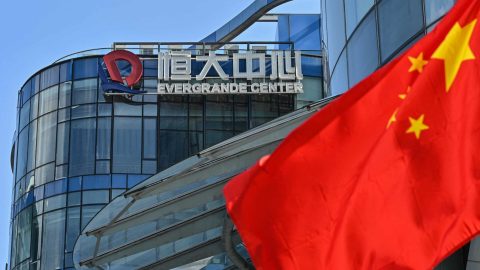The liquidity problems of the Chinese real estate developer Evergrande are heralding the end of the real estate boom in China.
The economic boom of China has gone hand in hand with an unprecedented boom in the real estate industry over the past decades.
However, this boom has its drawbacks and has led to an oversupply in recent years: according to a report by the Financial Times, the current vacancy rate in China would provide housing for more than 90 million people. A small number for China, but remarkable from a European perspective. After all, the vacant apartments would be enough to accommodate the entire population of one of five G7 states (France, Germany, Italy, the UK, or Canada).
“Real estate prices in China are stable.”
Wilhelm Spitaler, Portfolio Manager of Erste AM
The collapse of Evergrande: a self-inflicted malaise
The Chinese government reacted to the real estate boom and the resulting risks such as oversupply and speculation by imposing regulatory measures: Beijing has drawn – as the Financial report goes on to explain – three “red lines” in order to reduce the leverage: the ratio of debt to assets has to be below 70%, the ratio of net debt to equity has to be below 100%, and the ratio of cash to short-term liabilities has to be at least 100%. Evergrande violated all three thresholds, which led to the company being prohibited from taking on any further debt and thus caused financial difficulties and the current crisis. Said crisis is now increasingly turning into a political one.
The real estate market is an important part of the Chinese success story and thus also important for the future development of the country, which has proclaimed the motto of “common prosperity”. Rising real estate prices and prosperity are closely linked to the prospering economy; the government in Beijing has to ensure the sustainability of this development. Prosperity can also be achieved by way of innovation or the development of green technologies; here, China is currently in transition; this transition seems compromised by the problems of a large real estate company.
A bail-out of the company could lead market participants to a point where they, too, would want to claim help from the state. This is something the government in Beijing cannot and surely will not support.
However, as the volatile market has shown in recent days, a bankruptcy could also have negative effects on the economic development of China as a whole and put the political goal of common prosperity at risk.
Next days show if the problem is solved
The coming days and weeks will therefore probably show how the problem can be resolved; the most likely scenario is some sort of orderly liquidation that will cause the investors losses but that will prevent any spill-overs into other economic areas.
Evergrande is the first victim of the Chinese governmental regulatory measures – and unfortunately one of the biggest companies in the Chinese real estate sector. This is why the impact can even be felt on the US and the European stock exchanges.
To be fair, the rating of the company was never particularly good; it was never considered investment grade; indeed, the international rating agencies had rated it highly speculative for years. The economic downturn caused by the corona pandemic has now led to financial difficulties. Any economic ripple could really have set off a situation like this, so we should not be surprised.

Conclusion:
We are somewhat surprised though about the limited effect the Evergrande story has had on the real estate prices in selected Chinese cities, as shown in the graph above. We shall take this as positive signal that any negative effects from a possible Evergrande bankruptcy will remain within reasonable limits.
Legal note:
Prognoses are no reliable indicator for future performance.
Legal disclaimer
This document is an advertisement. Unless indicated otherwise, source: Erste Asset Management GmbH. The language of communication of the sales offices is German and the languages of communication of the Management Company also include English.
The prospectus for UCITS funds (including any amendments) is prepared and published in accordance with the provisions of the InvFG 2011 as amended. Information for Investors pursuant to § 21 AIFMG is prepared for the alternative investment funds (AIF) administered by Erste Asset Management GmbH pursuant to the provisions of the AIFMG in conjunction with the InvFG 2011.
The currently valid versions of the prospectus, the Information for Investors pursuant to § 21 AIFMG, and the key information document can be found on the website www.erste-am.com under “Mandatory publications” and can be obtained free of charge by interested investors at the offices of the Management Company and at the offices of the depositary bank. The exact date of the most recent publication of the prospectus, the languages in which the key information document is available, and any other locations where the documents can be obtained are indicated on the website www.erste-am.com. A summary of the investor rights is available in German and English on the website www.erste-am.com/investor-rights and can also be obtained from the Management Company.
The Management Company can decide to suspend the provisions it has taken for the sale of unit certificates in other countries in accordance with the regulatory requirements.
Note: You are about to purchase a product that may be difficult to understand. We recommend that you read the indicated fund documents before making an investment decision. In addition to the locations listed above, you can obtain these documents free of charge at the offices of the referring Sparkassen bank and the offices of Erste Bank der oesterreichischen Sparkassen AG. You can also access these documents electronically at www.erste-am.com.
N.B.: The performance scenarios listed in the key information document are based on a calculation method that is specified in an EU regulation. The future market development cannot be accurately predicted. The depicted performance scenarios merely present potential earnings, but are based on the earnings in the recent past. The actual earnings may be lower than indicated. Our analyses and conclusions are general in nature and do not take into account the individual characteristics of our investors in terms of earnings, taxation, experience and knowledge, investment objective, financial position, capacity for loss, and risk tolerance.
Please note: Past performance is not a reliable indicator of the future performance of a fund. Investments in securities entail risks in addition to the opportunities presented here. The value of units and their earnings can rise and fall. Changes in exchange rates can also have a positive or negative effect on the value of an investment. For this reason, you may receive less than your originally invested amount when you redeem your units. Persons who are interested in purchasing units in investment funds are advised to read the current fund prospectus(es) and the Information for Investors pursuant to § 21 AIFMG, especially the risk notices they contain, before making an investment decision. If the fund currency is different than the investor’s home currency, changes in the relevant exchange rate can positively or negatively influence the value of the investment and the amount of the costs associated with the fund in the home currency.
We are not permitted to directly or indirectly offer, sell, transfer, or deliver this financial product to natural or legal persons whose place of residence or domicile is located in a country where this is legally prohibited. In this case, we may not provide any product information, either.
Please consult the corresponding information in the fund prospectus and the Information for Investors pursuant to § 21 AIFMG for restrictions on the sale of the fund to American or Russian citizens.
It is expressly noted that this communication does not provide any investment recommendations, but only expresses our current market assessment. Thus, this communication is not a substitute for investment advice, does not take into account the legal regulations aimed at promoting the independence of financial analyses, and is not subject to a prohibition on trading following the distribution of financial analyses.
This document does not represent a sales activity of the Management Company and therefore may not be construed as an offer for the purchase or sale of financial or investment instruments.
Erste Asset Management GmbH is affiliated with the referring Sparkassen banks and Erste Bank.
Please also read the “Information about us and our securities services” published by your bank.
Subject to misprints and errors.


